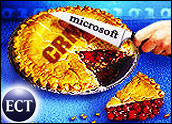
Microsoft is taking a bottom-up approach to customer relationship management with the second release of its CRM software, but one analyst said the software giant won’t stay in the small market forever.
“It makes sense to come from the bottom,” Joe Wilcox, senior analyst, Jupiter Research, told CRM Buyer. “SAP and Oracle don’t scale down. MSN came in at mid-market [with its first CRM software released in January 2003] and is now moving down where SAP and Oracle just don’t offer anything. My expectation is that Microsoft will absolutely move into the large enterprise space.”
Having a Similar Outlook
Microsoft CRM 3.0’s interface was designed to mimic Outlook. The software also includes close ties to Office software. Although this is a good thing for the Outlook customer base, it could cause some confusion, Wilcox said. “It’s an interesting strategy because of the potential overlap and customer confusion between CRM 3.0 and Business Contact Manager,” he said. “The biggest difference is that with Business Contact Manager, no server is required. With CRM 3.0, you want to have a server. Scalability is also a difference, but there’s definitely overlap in what they do.”
The new release also incorporates new marketing automation features, which one analyst said are the key new components.
“While customers have waited a long time for 3.0, the new version looks to be worth the wait, since it contains significant improvements over the current version. The most significant aspect of the release is the marketing automation capability, which rounds out Microsoft’s CRM suite. The solution today is only sales and service; marketing is the third piece of CRM,” Liz Herbert, senior analyst, Forrester Research, told CRM Buyer.
Service On-Demand
The software will also be available as an on-demand service through third-party partners, and will compete with such online services as Salesforce.com. Customers will pay a monthly application rental fee.
Microsoft is also releasing CRM 3.0, Small Business Edition, designed for companies that use Windows Small Business Server 2003 Premium Edition and have up to 75 employees.
In a sense, Microsoft is filling a niche created by the success of its own product.
“There are plenty of CRM products out there for the mid-market and above,” Wilcox said. “The small market was in some ways devastated by the release of Outlook about 10 years ago. Before outlook there were lots of contact management programs, maybe 25-30. Then that market really just evaporated. Now there’s a vacuum where Outlook just isn’t enough.”
Herbert said CRM 3.0 will advance Microsoft’s position in the market. “Microsoft CRM already has strong brand awareness, particularly in the SMB segment, and 3.0 will improve its positioning from a feature/function standpoint. Microsoft also has the advantage of owning significant back-office market share in the SMB segment with its Great Plains, Axapta and Navision products — and can cross-sell its CRM product into its existing ERP customer base,” she said.
CRM 3.0 is expected to be available to licensed Microsoft CRM customers in the fourth quarter. New customers will be able to purchase the software in the first quarter of 2006 through Microsoft channel partners. Pricing has not been announced.











































